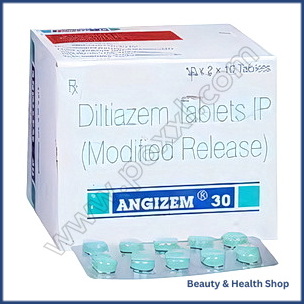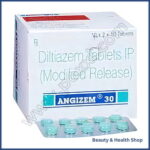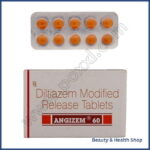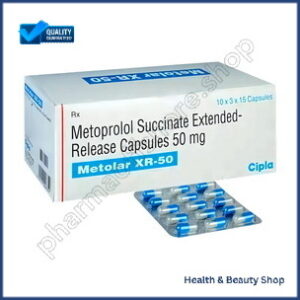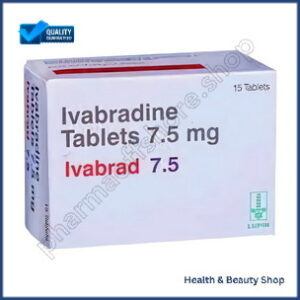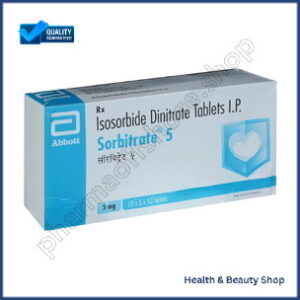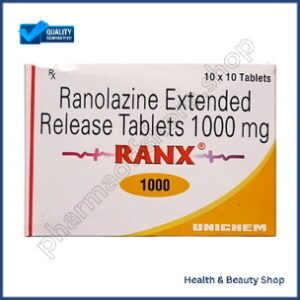ADDICTION
ALCOHOL DEPENDENCE
QUIT SMOKING
ALLERGY
ANTI FUNGAL
FUNGAL INFECTION
FUNGAL NAIL INFECTIONS
ANTI-REJECTION DRUGS
ANTI WORM
ANTIBIOTIC
BACTERIAL INFECTIONS
ARTHRITIS
GOUT
OSTEOARTHRITIS
RHEUMATOID ARTHRITIS
BLOOD
LOW PLATELET COUNT
THROMBOPHLEBITIS
VARICOSE VEINS
COLON
ANAL FISSURE
PILES
ULCERATIVE COLITIS
DIABETES CARE
DIABETES INSIPIDUS
DIABETES TYPE
DIABETIC FOOT ULCERS
GLUCOSE MONITOR
EYES/EAR CARE
DRY EYES
EYE CARE
EYE EXAMINATION
EYE INFECTION
EYE LASHES
EYE PAIN
GLAUCOMA
OCULAR HYPERTENSION
UVEITIS
FEVER CARE
MALARIA
RHEUMATIC FEVER
TYPHOID FEVER
GASTROINTESTINAL
ACIDITY
CONSTIPATION
CROHN'S DISEASE
DIARRHOEA
GALLBLADDER STONES
INTESTINAL ULCERS
IRRITABLE BOWEL SYNDROME
MOTION SICKNESS
NAUSEA
Angizem (Diltiazem)
Angizem Cd 120 mg (Diltiazem)
| Amount | Price | Price / Unit |
Qty | ||

|
30 Capsules | $31.00 | $1.03 |
||

|
60 Capsules | $40.00 | $0.67 |
||

|
90 Capsules | $53.00 | $0.59 |
Angizem Cd 180 mg (Diltiazem)
| Amount | Price | Price / Unit |
Qty | ||
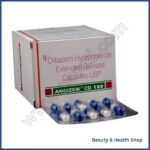
|
30 Capsules | $31.00 | $1.03 |
||

|
60 Capsules | $49.00 | $0.82 |
||

|
90 Capsules | $69.00 | $0.77 |
Angizem 30 mg (Diltiazem)
Angizem 60 mg (Diltiazem)
| Active Ingredient (Generic Name): | Diltiazem |
|---|---|
| Indication: | High blood pressure, Chest pain (Angina), Arrhythmias |
| Manufacturer | Sun Pharmaceutical Industries Ltd |
| Packaging: | 10 tablets in one strip and 10 capsules in one strip |
From: $36.00
Angizem (Diltiazem) is prescribed to manage cardiovascular health by blocking calcium ions in smooth muscle cells of the heart and blood vessels. This action reduces heart contraction force, relaxes blood vessels, and lowers blood pressure. As a result, it can help slow the heart rate, dilate blood vessels, decrease blood pressure, and improve cardiovascular health. Taking Angizem may reduce blood pressure, lower the risk of heart disease and stroke, and alleviate strain on the cardiovascular system. Understanding the benefits, potential side effects, and how to optimize its effects while minimizing risks of Angizem is essential for its effectiveness.
Main Points
- Angizem (Diltiazem) inhibits calcium ions to reduce heart contraction force, relax blood vessels, and lower blood pressure.
- It decreases heart rate, widens blood vessels, and enhances cardiovascular health, lowering the chances of heart disease and stroke.
- Common side effects of Angizem include dizziness, lightheadedness, headaches, fatigue, flushing, and rapid heartbeat.
- Angizem may interact with other medications, especially beta blockers and digoxin, increasing the risk of adverse reactions.
- Consistent intake of Angizem and adherence to precautions, like limiting grapefruit juice consumption, are crucial for optimizing benefits and minimizing risks.
How Angizem Works in the Body
Angizem blocks the influx of calcium ions into smooth muscle cells in the heart and blood vessels. This action reduces the heart’s contraction force and relaxes the blood vessels, lowering blood pressure. By inhibiting the flow of calcium ions into cardiac and vascular smooth muscle cells, Angizem decreases heart contraction and blood vessel constriction. This leads to a slower heart rate, dilated blood vessels, and decreased blood pressure.
Angizem also decreases the frequency and severity of anginal attacks by dilating coronary arteries, increasing blood flow to the heart. The medication’s vasodilatory effects reduce the heart’s workload, improving cardiovascular health. Overall, Angizem targets the underlying physiological processes of hypertension and angina, providing therapeutic benefits for patients with these conditions.
Benefits of Taking Angizem
Taking Angizem can lead to decreased blood pressure, lowering the risk of heart disease and stroke. It also helps to slow the heart rate, reducing strain on the cardiovascular system.
Reduces Blood Pressure
Angizem is effective in lowering blood pressure by relaxing blood vessels and improving blood flow. As a calcium channel blocker, it inhibits the entry of calcium into heart muscle cells, reducing the workload of the heart and decreasing blood pressure. The relaxed blood vessels widen, facilitating easier blood flow and ultimately reducing the risk of heart disease, kidney disease, and stroke.
Slows Heart Rate
By slowing the heart rate, Angizem decreases the heart’s oxygen demand, reducing the risk of chest pain and cardiovascular complications. This is beneficial for individuals with hypertension as it eases the workload on the heart, resulting in fewer chest pain episodes and a lower risk of heart attack and stroke. The slowed heart rate also improves overall cardiovascular health by reducing cardiac workload, lowering blood pressure, enhancing exercise tolerance, improving cardiac output, and decreasing the risk of arrhythmias for a more stable heart rhythm.
Possible Side Effects to Watch
While taking Angizem (Diltiazem), you may experience a range of side effects, from mild to severe, with varying frequencies. These side effects can impact your daily life, so it’s important to be aware of them.
- Common side effects include dizziness, lightheadedness, headaches, fatigue, flushing, and rapid heartbeat.
- Less common side effects may include nausea, vomiting, increased urination, swelling, and abnormal liver function tests.
In some cases, more severe side effects like low blood pressure, allergic reactions, or heart rhythm disturbances can occur. If you notice any of these symptoms, seek immediate medical attention. Before starting Angizem, discuss your medical history and any concerns with your doctor to weigh the benefits against potential risks. Stay informed to make an educated decision about using Angizem for your condition and always adhere to the prescribed dosage and schedule to reduce the risk of side effects.
Interactions With Other Medications
When combining Angizem with other medications, there is an increased risk of adverse interactions that can affect the effectiveness of the treatment. It is important to inform your doctor about all current medications, including over-the-counter drugs and supplements.
Certain medications can interact with Angizem, potentially leading to reduced efficacy or heightened side effects. Caution should be exercised when using the following medications alongside Angizem:
- Beta blockers: may elevate the risk of bradycardia and heart block
- Digoxin: may raise digoxin levels, resulting in toxicity
- Cimetidine: may increase Angizem levels, causing adverse effects
- Carbamazepine: may lower Angizem levels, reducing its effectiveness
- Rifampin: may decrease Angizem levels, diminishing its effectiveness
Consulting with your doctor about your medication regimen is essential to minimize the chances of adverse interactions and to ensure optimal treatment outcomes.
Precautions and Contraindications
When considering taking Angizem, it is essential to understand the precautions and contraindications associated with this medication. It is important to be aware of the specific groups who should not take Angizem and the special warnings and precautions necessary for safe and effective treatment. Understanding these critical points can help minimize risks and maximize the benefits of Angizem therapy.
Who Should Not Take
Certain individuals should not take Angizem due to an increased risk of adverse reactions or interactions. It’s crucial to be aware of the contraindications to ensure your safety. You should avoid Angizem if you have sick sinus syndrome without a functioning pacemaker, second- or third-degree atrioventricular block without a functioning pacemaker, hypotension, cardiogenic shock, acute myocardial infarction with pulmonary congestion, or if you are taking ivabradine due to the potential risk of bradycardia. If you fall into any of these categories, consult your healthcare provider for alternative treatment options. Prioritizing your health is essential, so make sure to discuss these contraindications with your doctor.
Special Warnings and Precautions
During treatment with Angizem, it is important to monitor for potential adverse reactions. Diltiazem may exacerbate underlying conditions or interact with other medications. Patients with pre-existing heart conditions, such as heart failure or sinus node dysfunction, are at a higher risk of experiencing adverse effects. Diltiazem can also worsen bradycardia, first-degree atrioventricular block, or left ventricular dysfunction.
Caution should be exercised when using Angizem in combination with other medications, especially beta blockers, as this may increase the risk of bradycardia. Concomitant use with medications that slow down heart rate, like digitalis, can also lead to adverse interactions. Avoid consuming grapefruit juice while taking Angizem, as it can elevate the concentration of diltiazem in the bloodstream.
Inform your healthcare provider about all medications you are currently taking, including over-the-counter drugs and supplements, to reduce the risk of adverse interactions. By being aware of these potential risks and taking necessary precautions, you can minimize the likelihood of adverse reactions and ensure the safe use of Angizem.
Proper Dosage and Administration
To ensure optimal effectiveness and minimize potential side effects, adhere to the prescribed regimen for taking Angizem (Diltiazem) as instructed by your healthcare provider. Do not alter the dosage or discontinue the medication without consulting your doctor first.
Remember the following when taking Angizem:
- Swallow the tablets whole to maintain proper absorption.
- Take the medication with food or milk to reduce stomach discomfort.
- Avoid consuming grapefruit juice, as it can impact Angizem levels in your bloodstream.
- Consistently take the medication at the same time each day.
- Monitor your blood pressure regularly to assess the medication’s efficacy and adjust the dosage if necessary.
Alternatives to Angizem
If Angizem is not suitable for you, your healthcare provider may recommend other calcium channel blockers or different classes of medications to manage hypertension. Options may include verapamil (Calan) or nifedipine (Procardia) as alternative calcium channel blockers. Diuretics like hydrochlorothiazide (HCTZ) can help reduce blood volume, while beta blockers such as metoprolol (Lopressor) can slow the heart rate. ACE inhibitors like enalapril (Vasotec) may also be considered to lower blood pressure by blocking ACE. Your healthcare provider will assess your medical history and health status to determine the best alternative for you. Adjustments to dosage or medication combinations may be made for optimal results. Collaboration with your healthcare provider is crucial to finding the most effective and tolerable hypertension treatment for you.
Frequently Asked Questions
Can I Take Angizem With Food or on an Empty Stomach?
When taking medication, it’s important to follow the specific instructions provided with your prescription. If no guidance is given, it’s best to take your medication with a full glass of water. Whether you take it with or without food depends on the medication’s properties and your doctor’s advice.
Is Angizem Safe for Use During Pregnancy or Breastfeeding?
When considering medication during pregnancy or breastfeeding, it’s essential to be cautious. It’s important to weigh the benefits against potential risks to the fetus or baby. Consulting your doctor before taking any medication is crucial as they can assess your individual situation and provide personalized guidance. It’s vital to discuss the safety of Angizem with your doctor since its effects on pregnancy and breastfeeding have not been well-studied.
Can I Drink Alcohol While Taking Angizem?
While taking Angizem (Diltiazem), it is advisable to refrain from consuming alcohol to avoid potential adverse effects. Alcohol can heighten the sedative effects of the medication, leading to increased drowsiness, dizziness, and impaired cognitive function. Prioritizing your health by avoiding alcohol will help ensure the safe and effective management of your condition.
How Long Does It Take to See the Effects of Angizem?
When starting a new medication like Angizem, improvements in lower blood pressure and reduced chest pain may be noticeable within 1-2 weeks of beginning treatment. Further enhancements may be observed as your body acclimates to the medication over time.
Can I Stop Taking Angizem Abruptly or Do I Need to Taper Off?
When discontinuing medication, it is important to consider the potential risks of abrupt cessation. Stopping Angizem suddenly can result in adverse reactions or withdrawal symptoms. It is recommended to taper off the medication under the guidance of your doctor to allow your body to adjust gradually to the decrease in dosage and minimize any potential side effects.
Conclusion
You have been prescribed Angizem to manage high blood pressure or angina. You understand its mechanism, benefits, and potential side effects. You are aware of interactions with other medications and necessary precautions. Adhere strictly to the prescribed dosage and administration instructions. Consider alternative options if needed. With informed use, Angizem can effectively regulate heart rate and alleviate symptoms.

